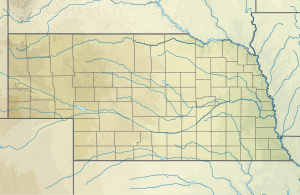Little Sandy Creek (Niobrara River tributary)
Appearance
| Little Sandy Creek Tributary to Niobrara River | |
|---|---|
| Location | |
| Country | United States |
| State | Nebraska |
| County | Holt |
| Physical characteristics | |
| Source | Brush Creek divide |
| • location | about 2 miles south-southeast of Badger School |
| • coordinates | 42°49′21.00″N 098°53′11.00″W / 42.8225000°N 98.8863889°W[1] |
| • elevation | 1,675 ft (511 m)[1] |
| Mouth | Niobrara River |
• location | about 0.25 miles southeast of Badger School |
• coordinates | 42°50′22.00″N 098°53′8.33″W / 42.8394444°N 98.8856472°W[1] |
• elevation | 1,588 ft (484 m)[1] |
| Length | 1.24 mi (2.00 km)[2] |
| Basin size | 10.04 square miles (26.0 km2)[3] |
| Discharge | |
| • location | Niobrara River |
| • average | 1.24 cu ft/s (0.035 m3/s) at mouth with Niobrara River[3] |
| Basin features | |
| Progression | Niobrara River → Missouri River → Mississippi |
| River system | Niobrara |
| Bridges | 898th Road |
Little Sandy Creek is a 1.24 mi (2.00 km) long first-order tributary to the Niobrara River in Holt County, Nebraska.
Course
[edit]Little Sandy Creek rises on the Brush Creek divide about 2 miles (3.2 km) south-southeast of Badger School in Holt County and then flows generally north to join the Niobrara River about 0.25 miles (0.40 km) southeast of Badger School.[1]
Watershed
[edit]Little Sandy Creek drains 10.04 square miles (26.0 km2) of area, receives about 24.7 in/year (63 cm/year) of precipitation, and is about 0.87% forested.[3]
See also
[edit]References
[edit]- ^ a b c d e "Geographic Names Information System". edits.nationalmap.gov. US Geological Survey. Retrieved 5 November 2022.
- ^ "ArcGIS Web Application". epa.maps.arcgis.com. US EPA. Retrieved November 5, 2022.
- ^ a b c "Little Sandy Creek Watershed Report". watersgeo.epa.gov. US EPA. Retrieved 5 November 2022.


